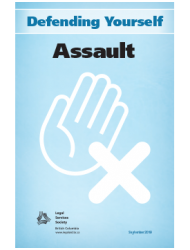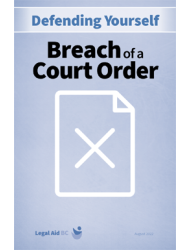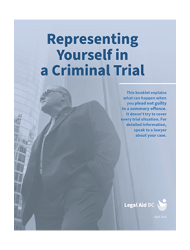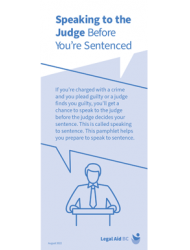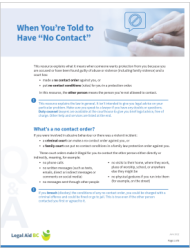When You’re Told to Have “No Contact”
This resource explains what it means when someone wants protection from you because you are accused or have been found guilty of abuse or violence (including family violence) and a court has:
- made a no contact order against you, or
- put no contact conditions (rules) for you in a protection order.
In this resource, the other person means the person you’re not allowed to contact.
On this page
This resource explains the law in general. It isn’t intended to give you legal advice on your particular problem. Make sure you speak to a lawyer if you have any doubts or questions. Duty counsel lawyers are available at the courthouse to give you brief legal advice, free of charge. Other help and services are listed at the end.
|
What’s a no contact order?
If you were involved in abusive behaviour or there was a violent incident:
- a criminal court can make a no contact order against you, or
- a family court can put no contact conditions in a family law protection order against you.
These court orders make it illegal for you to contact the other person either directly or indirectly, meaning, for example:
- no phone calls
- no written messages (such as texts, emails, direct or indirect messages or comments on social media)
- no messages sent through other people
- no visits to their home, where they work, place of worship, school, or anywhere else they might be
- no physical gestures if you run into them (for example, on the street)
If you breach (disobey) the conditions of any no contact order, you could be charged with a criminal offence and could be fined or go to jail. This is true even if the other person contacted you first or agreed to it.
Types of no contact orders
There are five types of court orders commonly called no contact orders.
Condition of release from custody before trial (bail): If you’ve been charged with assaulting, threatening, or causing violence or fear to the other person, you may be ordered not to contact them until your trial is complete. The police, a judge, or justice of the peace can make this order.
- A condition of release applies until your trial is over. If you’re found guilty, it applies until you’ve been sentenced and after (if it becomes a condition of your probation).
Condition of probation: If you plead guilty or are found guilty, the judge may sentence you to probation instead of jail. Or the judge may order probation after you get out of jail. The judge will order that you follow certain conditions during probation. One of the conditions could be a no contact order.
- A condition of probation order can last for up to three years.
Conditional sentence: If you’re convicted of a crime and given a conditional sentence, this means you won’t go to jail. Instead, you’ll serve your sentence in the community and have to obey certain conditions. Those conditions might include a no contact order.
- A conditional sentence can last for up to two years minus one day.
Peace bond: The police can ask for a peace bond to keep you from contacting someone who reasonably fears for their safety. There’ll be a hearing in criminal court and the judge will decide whether to order a peace bond and what the conditions will be. The peace bond usually includes the condition that you not have any contact with the other person (and if it’s your partner, any of your or your partner’s children). While you’re waiting for the peace bond hearing, you’ll have the no contact condition as a part of your bail.
The peace bond doesn’t give you a criminal conviction. But you can be charged with a criminal offence and get a criminal conviction on your record if you don’t obey the conditions.
- A peace bond can last for up to one year.
Family law protection order: Your partner (or another family member) can apply to family court to have no contact conditions put in a family law protection order. They can apply without letting you know. The order can be made even if you aren’t at the court hearing. You’ll get a copy of it.
The judge can order that you have no contact with the person named (and if it’s your partner, any of your or your partner’s children). You’ll have to stay away from certain places where they might be. A family law protection order may also include orders about not having weapons or other things. You can go to court to ask to have the order set aside (cancelled) if you think it isn’t reasonable.
The family law protection order doesn’t give you a criminal record. But you can be charged with a criminal offence and get a criminal record if you don’t obey the conditions. The police are allowed to enforce the order and use reasonable force if necessary.
- A family law protection order lasts until the date noted on the order. If there’s no end date on the order, it will last for one year.
If you breach (disobey) the conditions of any no contact order, you could be charged with a criminal offence and could be fined or go to jail. This is true even if the other person contacted you first or agreed to it.
Obeying the no contact order or conditions
If the other person phones and wants to see me, is it okay to meet?
No. If you have any kind of no contact order, you can be charged with a criminal offence if you try to make contact. This is true even if both of you want to meet. You must apply to a judge in either criminal court or family court to change the order before you can contact the other person.
The other person is constantly trying to text, call, or come find me. What should I do?
Don’t reply and walk away if necessary. Tell your bail supervisor or probation officer if you have one.
Can I get a no contact order or no contact conditions changed?
You can ask the court that made the order to vary it. In criminal court, Crown counsel must agree to the change and you must appear before the judge to explain why. In family court, the other person has to agree as well. If they don’t agree, it will be up to the judge to decide. In either court, the judge will have to agree that the other person (and if it’s your partner, any of your or your partner’s children) are no longer at risk of harm from you.
Talk to your lawyer, or duty counsel or registry staff at the courthouse about how to apply to court to change the order.
Access to your home
I was taken to an overnight jail cell after a family violence incident. Does my partner have the right to keep me out of my house?
Yes, your partner has that right if there’s a no contact order in place with the condition that you not go to your home. The police or a justice of the peace may order you to have no contact with your partner or to not go to your home when you’re released.
Talk to your lawyer or duty counsel at the courthouse about how to apply to court for an order that gives you the legal right to enter the home.
I was released from jail with a no contact order. The police took me home to pick up my things because I’m not allowed to live there now. I forgot my laptop and work clothes. What can l do?
Don’t contact the other person directly or through another person. You could be charged with breaking the no contact order.
You can ask the court for an order to get your things. Talk to your lawyer, duty counsel at the courthouse, your bail supervisor or probation officer, a Native Courtworker, or a family justice counsellor about how to do that.
Contact with your children
The order says I can’t speak to my partner or go near the home. Can I see my children?
When you’re charged with causing fear to, endangering, assaulting, or threatening your partner in front of your children or in a way that puts your children at risk, the court may also order you to have no contact with your children.
Try to get the court not to make that order or to allow some contact with them such as with a third party. You can ask the court instead to order that you have “no contact or parenting time with the children unless ordered by a family court.” This would let you arrange with family court to spend time with your children. You wouldn’t have to change the no contact order. The process to change the no contact order in criminal court can be difficult and take a long time.
Family law protection order
Your partner might go to family court to get a family law protection order. You might already have a parenting order that says whether you have parenting time or contact with your children, and what the conditions are. The protection order overrules the parenting order. Talk to family duty counsel at the courthouse or a family justice counsellor about how to arrange to see your children. You may have to go to family court to find out what your rights are.
The judge may order that with certain conditions you can continue to have parenting time or contact with your children. For example, the judge may say someone has to supervise your visits with your children. Remember, if a protection order is different from the parenting order, the protection order applies.
Family court has ordered that my parenting time or contact with my children be supervised. How can I get that changed?
You’ll have to prove to a judge that things have changed in your life that make it reasonable to change the order. The judge will look at what’s in the children’s best interests.
For help to change an order, talk to family duty counsel at the courthouse or find out if you qualify for the Family LawLINE phone service (phone numbers below). A family justice counsellor may also be able to tell you how to apply to the court to have the order changed.
- For online help with the process to change an order, see the Family Law in BC website:
Criminal court: Contact duty counsel (at the courthouse), a Native Courtworker if you’re Indigenous, or your local advocates organization:
Family court: Contact family duty counsel (at the courthouse), or the family justice counsellor at the Justice Access Centre or Family Justice Centre in your area.
To speak to a family justice counsellor, call Service BC at:
604-660-2421 (Greater Vancouver)
250-387-6121 (Victoria)
1-800-663-7867 (elsewhere in BC)
Family LawLINE: You may qualify for free legal advice by phone from a family lawyer (for issues such as parenting time or contact with a child).
For more information or to apply for legal aid, call the Legal Aid BC Call Centre:
604-408-2172 (Greater Vancouver)
1-866-577-2525 (elsewhere in BC)
(Pacific Time)
Mon, Tue, Thu, and Fri — 9 am to 4 pm
Wed — 9 am to 2:30 pm
Lawyer Referral Service: If you don’t have a lawyer, call to get the name of one. You can have a free 15-minute appointment to find out if you have a case.
604-687-3221 (Greater Vancouver)
1-800-663-1919 (elsewhere in BC)
BC criminal justice system information:
Legal Aid BC resources:
Ask for free Legal Aid BC criminal law publications at your local legal aid location or read them online:
When there’s been abuse and family violence:
This page is also available as a fact sheet:
Read other resources


